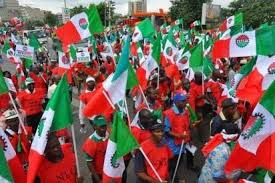The Abuja Chamber of Commerce and Industry (ACCI), has urged the Federal Government and Labour Unions to prioritise the nation’s economic well-being by seeking amicable resolutions to disputes.
The President of ACCI, Emeka Obegolu, said this in an interview with the News Agency of Nigeria (NAN) in Abuja.
Obegolu was reacting to the recent strike embarked upon by the Nigeria Labour Congress (NLC) and the Trade Union Congress (TUC) as well as the effects on businesses and the economy.
The NLC and TUC had on June 3, enjoined other affiliate unions on an indefinite strike.
The strike was prompted by the clamour for a new minimum wage for Nigerian workers, aimed at ameliorating effects of the country’s current economic realities attributed to harsh government policies.
The ACCI president expressed deep concern over any strike action, saying that it had detrimental effects on the economy, particularly small businesses. “The ACCI encourages the need for constructive dialogue and negotiations to resolve disputes without resorting to strikes. “We are urging all stakeholders to engage in open and effective communication to find sustainable solutions that protect our economy and the livelihood of millions of Nigerians. “We understand that the ripple effects of strikes extend beyond immediate financial losses, it hinders supply chains, delays projects, and creates an uncertain business environment. “This uncertainty discourages investment and stifles economic growth, and we must stand against this,’’ Obegolu said.
According to him, strike actions pose significant challenges to economic stability and growth. They disrupt economic activities, leading to a loss of productivity, revenue, and business confidence.
The ACCI president said it mostly affected small businesses, which are our economy’s backbone. This resulted in severe financial strain and, in some cases, business closure.
He, therefore, expressed the Chamber’s readiness to facilitate discussions and provide necessary support to mitigate the adverse impacts on small businesses and the broader economy. Similarly, an analyst, Gloria Uke, said the strike actions protesting against austerity measures and the government’s economic policies had adverse effects on the country’s economy.
Uke said while the workers demanded better wages and improved working conditions, businesses grappled with the sudden disruption to operations and supply chains.
According to her, this action is detrimental to businesses and economic growth and should be avoided as much as possible.
An economist, Thomas Geoffrey, said the strike’s impact transcended sectors, seeping into daily life and affecting everything from healthcare services to education.
Geoffrey said the strike affected the volume of foreign direct investment, increased unemployment, reduced consumer confidence, led to decreased spending, and stagnated the retail sector.
“We must, therefore, find a balance between our aspirations for better livelihoods and the need for economic stability,” Geoffrey said.
For Mr. Ignatius Itodo, a businessman, strike action is an enemy of progress. It halts business activities and leads to poverty and hunger. (NAN)


